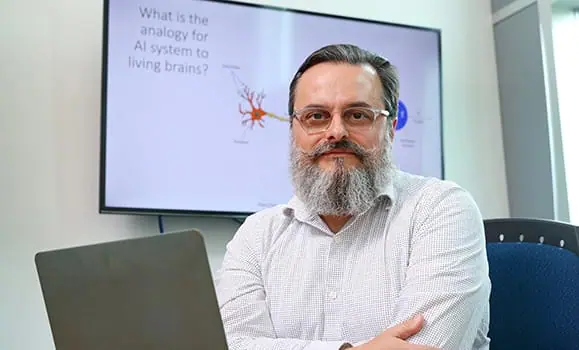The release of ChatGPT in November 2022 rang alarm bells across university campuses like Dalhousie as schools rushed to develop policies for navigating the free-to-use AI software.
Christian Blouin, the associate dean academic for the Faculty of Computer Science, said the conversation around AI at universities is often framed as an issue of plagiarism or “honesty vs. dishonesty.”
Blouin is also Dal’s institutional AI lead, a role he took to help guide the university’s approach to disruptive technologies. He’s concerned that the issue is bigger than just plagiarism.
“If we don’t approach this properly, we’re in danger of creating a generation of people who will accept whatever comes out of software as truth,” Blouin said.
Second-year Dalhousie student Sydney Guker-Wickie described how strict some of her professors’ AI policies are.
“Don’t even think about using it or you’ll be expelled, [is what I was told] for four out of five of my classes,” she said.
That’s not the case for all courses. Guker-Wickie said she has one professor who takes a different approach and allows students to incorporate AI as a learning tool.
“His outlook has made his class more enjoyable and less stressful,” she said.
Guker-Wickie has used AI to help her better understand difficult concepts.
Robert Huish, a professor of international development studies at Dal, notes that it’s not just students who can use AI tools, professors themselves could also turn to AI to develop courses.
“Students can game the system, but professors have the same ability to game the system,” Huish said. “If both parties are using this technology to try and find shortcuts through this four-year experience, we really do have to sit back and say, ‘Why are we here in the first place?’”
Huish said that university is not just about obtaining knowledge but gaining a skill set to engage with a challenging world.
“If you’re on the scene of a fire or a car accident, and you’re asking ChatGPT for help, we’re
done,” said Huish, who is also a firefighter with Halifax Regional Fire & Emergency.
The first-year Introduction to Humanities course in the Faculty of Arts and Social Sciences addresses AI by asking students to think critically about the societal implications of its use.
Kathleen Cawsey is a Dalhousie English professor who worked on developing the course.
“For first years specifically, I think students understand that teachers don’t like it because it’s cheating, because it’s wrong. But, they don’t really get why it’s wrong. Or why we don’t like it,” Cawsey said.
“I really try to get beyond ‘it’s cheating’ level of analysis,” she said.
The introductory course dedicates a week to analyzing the impacts of ChatGPT. As part of that lesson, Cawsey said she tries to get students to understand what the point of a university education is.
“We’re not assigning essays because we need the final product. It’s the process of writing that’s important,” she said. “Students who use these AI models are skipping right over that. It’s easy to catch them now. But, [AI tools are only] going to get better.”
Katie Turcotte, a Dalhousie English professor who also teaches first-year students, said she currently doesn’t allow students to use AI in class.
“There have been instances where we have flagged potential use of AI and looked them over and not been sure,” she said. “But we always err on the side of the student and point out where the errors are and hope that in pointing out those errors we can show the flaws of the software.”
“I have seen some assignments submitted that still say ‘ChatGPT’ at the bottom,” Huish said.
Dal has advised professors to not use any tools that claim to be able to detect AI usage in assignments, citing concerns of bias and unreliability.
“I think the real solution is not a regulation.,” Blouin said. “It’s not a policy. It’s not a matter of honesty. It’s a matter of what we teach, why we teach it and how we make sure that when we give a grade to a student, it actually means something about them.”


Recent Comments